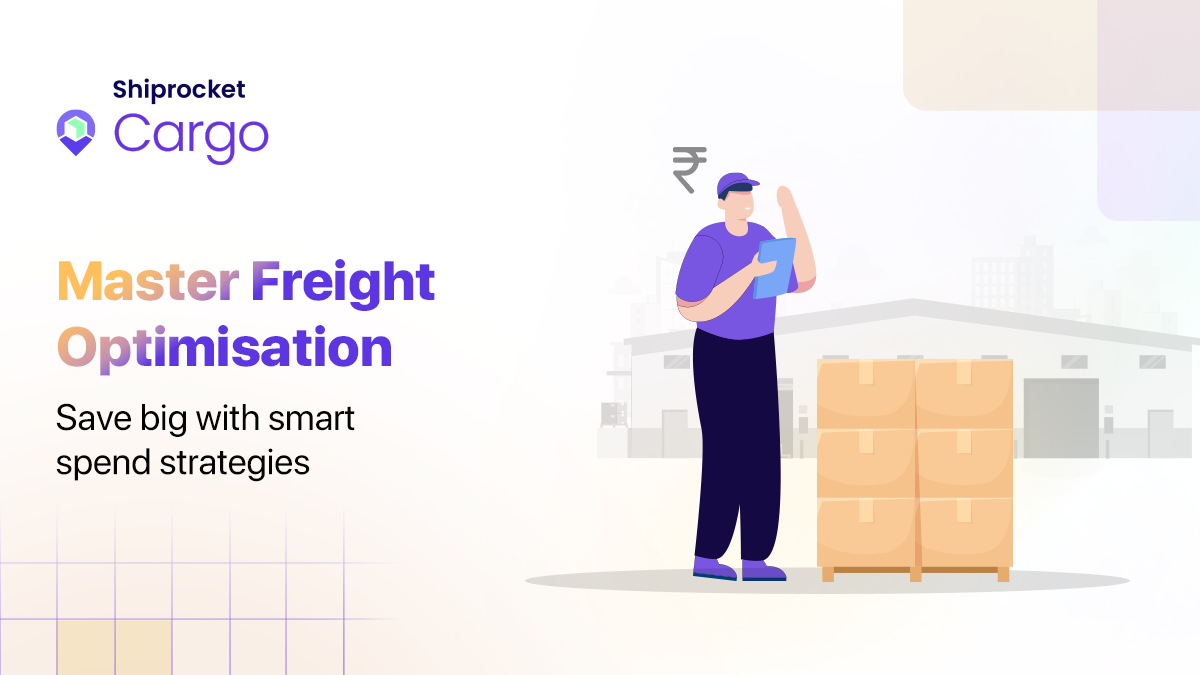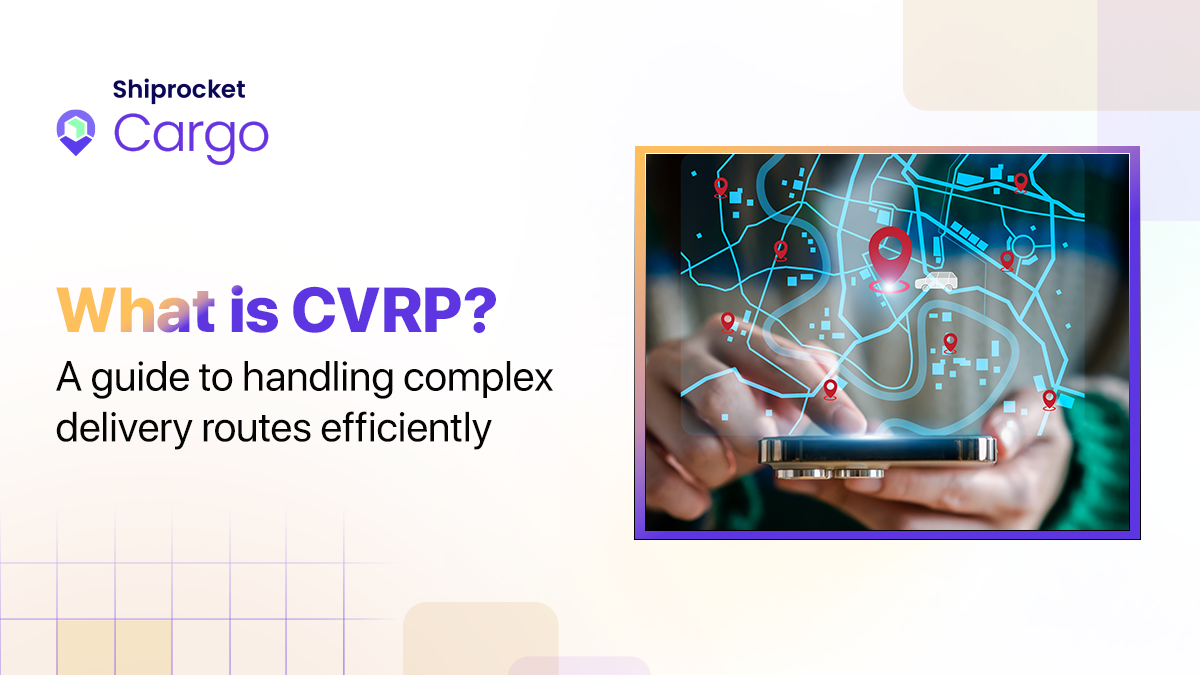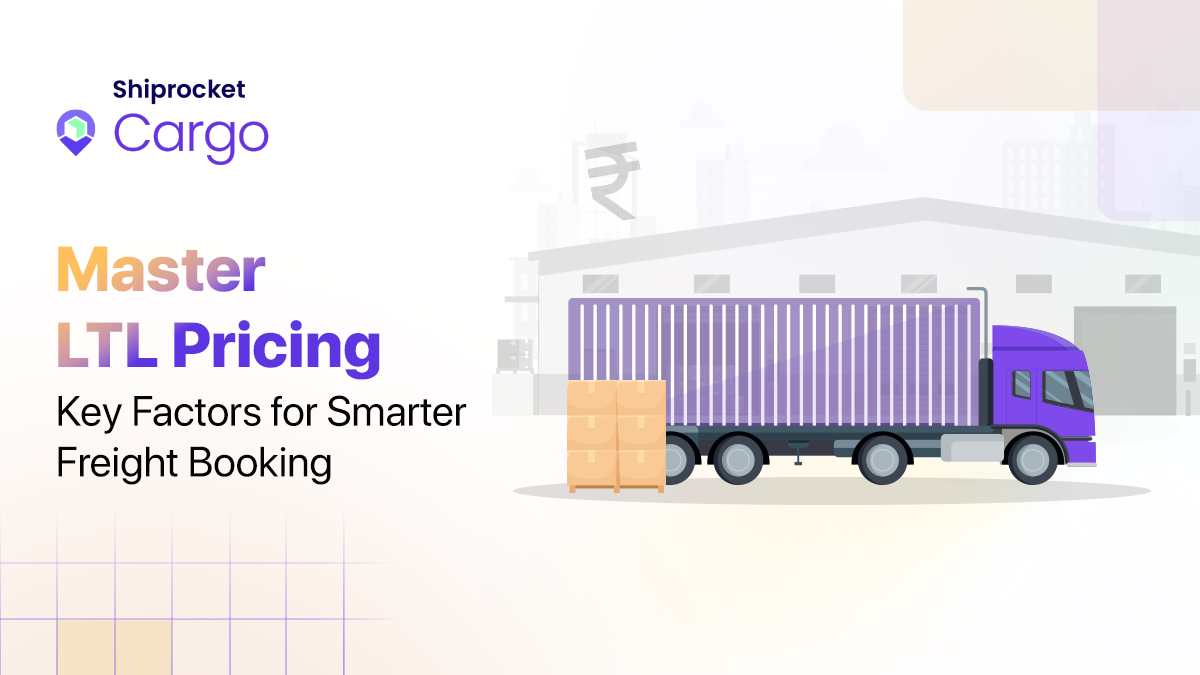How Quantum Computing in Logistics Can Transform Supply Chain Systems
- TL;DR
- Introduction
- What is Quantum Computing and What Does it Mean in Logistics?
- Why Quantum Computing is Ideal for Route Optimisation and Demand Forecasting
- The Technology Timeline: How Close are We to Quantum-Ready Supply Chains?
- Preparing for the Shift: Talent, Tools, In Quantum Integration
- Why Platforms Like Shiprocket Cargo are Crucial in a Quantum-Driven Future
- Conclusion
- FAQs
TL;DR
Quantum computing in logistics solves complex challenges that traditional systems can’t. You can use it to optimise delivery routes, forecast demand accurately, manage inventory better, and design smarter supply chain networks. With its ability to process vast data in real-time, quantum computing enables dynamic fleet scheduling, real-time route adjustments, and adaptive planning. While full adoption is still emerging, early pilots by major companies show promising results. Platforms like Shiprocket Cargo provide the infrastructure to leverage these quantum advancements, enabling you to scale efficiently, reduce costs, and stay competitive in the next generation of intelligent and responsive supply chains.
Introduction
Quantum computing is expected to transform logistics by solving problems that traditional systems can’t handle efficiently. In your supply chain, this means optimising every layer, from route planning to inventory control.
Quantum computing can calculate and adjust delivery paths to save time and fuel, manage large delivery networks, and adapt quickly to delays. All this results in lower transportation costs and happier customers.
In addition to routing, quantum computing enables smarter network design, more accurate demand forecasting, and more efficient fleet scheduling. Regardless of whether you want to pack cargo more effectively or maintain vehicles with minimal downtime, quantum technology can give you the tools to build a faster, leaner, and more intelligent logistics system.
This blog will explore the basics of quantum computing in logistics, why it’s essential for your business, how you can properly implement it, and more.
What is Quantum Computing and What Does it Mean in Logistics?
Quantum computing in logistics refers to the application of quantum computers (machines leveraging the unique properties of quantum mechanics) to solve highly complex optimisation, simulation, and prediction problems in logistics and supply chain management.
Quantum computers use quantum bits (qubits), which operate according to principles of quantum mechanics. These can represent 1 and 0 simultaneously, allowing them to process more data in parallel than traditional bits. This enables them to tackle complex logistics and supply chain management challenges such as route optimisation, fleet management, inventory forecasting, scheduling, and supply chain network design with greater precision and speed. Traditional computers often face major limitations when handling these complex problems.
Logistics and global supply chains are characterised by:
- Vast networks of suppliers, manufacturers, warehouses, and transportation.
- Enormous volumes of data and a need to make rapid, optimal decisions.
- Complex, NP-hard problems (like multi-drop routing or delivery slot assignment) that classical systems struggle to solve efficiently.
Quantum computing holds potential to transform these areas through its unique strengths fundamentally:
Route Optimisation
Quantum algorithms evaluate millions of possible delivery routes instantly. You can optimise fleet routing, reduce fuel costs, and respond in real time to changes in traffic, weather, or road conditions. Quantum computing is a promising approach to enhancing last-mile delivery and improving the overall efficiency of delivery routes.
Supply Chain and Inventory Management
Quantum systems help you manage inventory more precisely by forecasting demand with greater accuracy. These systems can analyse multiple variables simultaneously, enabling real-time inventory optimisation, reduced overstocking or stockouts, and better response to shifting consumer trends.
Warehouse Layout and Operations
Quantum solutions can solve complex problems like bin-packing and pick-path optimisation at scale, leading to better space utilisation, faster order picking, and more streamlined warehouse processes.
Fleet Scheduling and Resource Assignment
Quantum models optimise vehicle scheduling and driver assignment by accounting for constraints like delivery windows, vehicle capacity, and maintenance schedules. You can also extend this optimisation to production planning and staff allocation, improving resource efficiency across the supply chain.
Forecasting and Demand Prediction
With quantum-enhanced machine learning, you can analyse enormous volumes of historical and real-time data to make highly accurate demand forecasts. This allows you to align supply more closely with demand, improving customer satisfaction while minimising excess inventory.
Supply Chain Network Design
Quantum computing enables the modelling of entire supply chain networks, from suppliers to distribution centers to end customers. You can evaluate countless configurations, perform risk assessments, and dynamically adapt your supply chain design to shifts in demand, supplier disruptions, or global events.
Dynamic Risk Assessment and Disruption Management
Real-time simulations powered by quantum models help you respond quickly to disruptions like unfavourable weather conditions, strikes, or demand spikes. You can assess multiple scenarios, identify optimal responses, and ensure business continuity with minimal delays or losses.
Supplier Risk Modelling
Quantum computing allows you to map and analyse multi-tier supplier networks with unmatched depth. Unlike classical systems, quantum models can simulate cascading disruptions across global supply chains, identifying vulnerabilities and bottlenecks in real time. This enables proactive supplier risk mitigation, strengthens resilience, and supports better contingency planning in dynamic environments.
Why Quantum Computing is Ideal for Route Optimisation and Demand Forecasting
Quantum Computing for Route Optimisation
Quantum computing is exceptionally well-suited for route optimisation because it leverages the inherent properties of quantum mechanics, namely superposition and entanglement, to tackle combinatorial optimisation problems far more efficiently than classical computers.
Key advantages of quantum computing for route optimisation include:
- Parallelism and Superposition: Quantum computers use qubits that can represent multiple states simultaneously, enabling them to evaluate many possible routes in parallel, which delivers exponential speed-up for complex, large-scale problems such as the Travelling Salesman Problem (TSP) or Vehicle Routing Problem (VRP).
- Efficient Handling of Constraints: Quantum algorithms like the Quantum Approximate Optimisation Algorithm (QAOA) can efficiently incorporate constraints, like delivery time windows, vehicle capacity, and real-time traffic conditions, when optimising routes.
- Real-Time Adaptation: Due to their processing power, quantum solutions can adapt routes dynamically as new data (e.g., changing traffic patterns) is received, making them ideal for real-time logistics and fleet management scenarios.
- Scalability: As delivery networks and routing problems grow in size and complexity, quantum computing can scale more effectively, providing solutions that are impractical or impossible for classical systems to achieve within reasonable timescales.
Quantum Computing for Demand Forecasting
Quantum computing also brings revolutionary capabilities to demand forecasting for logistics and supply chains by processing massive datasets and uncovering complex patterns that classical systems would miss or take too long to analyse.
Here’s why quantum computing is beneficial for demand forecasting:
- Handling Large Datasets: Quantum computers can process and analyse vast, high-dimensional datasets in parallel, identifying subtle patterns and correlations in sales, supply, and demand data that impact forecasting accuracy.
- Quantum Machine Learning: Quantum neural networks and quantum-assisted algorithms can be used for demand prediction, reducing training times and improving parameter efficiency compared to classical machine learning models.
- Robustness to Noise and Uncertainty: Quantum computing’s ability to manage noisy or incomplete data makes its predictions more reliable, especially in environments where data quality might lower the accuracy of classical forecasts.
- Optimising Inventory: Enhanced demand forecasts translate directly to improved inventory management, reducing costs from overstocking and minimising lost sales due to stockouts.
- Real-Time Forecast Adjustment: Integration with IoT and real-time data sources allows quantum models to update forecasts, responding instantly to changing trends continually.
The Technology Timeline: How Close are We to Quantum-Ready Supply Chains?
Most global supply chains are not yet fully quantum-ready, but significant progress is underway:
Pilot Initiatives and Experimentation
Leading organisations are running pilot projects, proofs of concept, and experiments on cloud-based quantum-as-a-service platforms from providers like IBM, Microsoft, and AWS.
Early Adopters
Large corporations in retail and logistics, such as Amazon and Walmart, are leveraging quantum capabilities for supply chain optimisation, forecasting, and route planning.
Limited Production Use
The vast majority of supply chain operations have not reached the stage of widespread production adoption. Quantum computing is not yet fully developed or widely used in this industry. Instead, it’s at a beginner stage, where researchers and companies are exploring possibilities, prototypes are being built and tested, and practical, large-scale applications are still limited.
Some challenges that can arise in the process of adopting quantum mechanics include:
- Technology Maturity: Quantum systems still lack the scale and reliability needed for broad commercial use. Most use cases are still in pilot or research stages.
- Hardware and Supply Chain Issues: Specialised components, materials (e.g., helium-3, superconducting cables), and skilled labour are scarce, leading to long lead times and bottlenecks even within the quantum hardware supply chain itself.
- Security Concerns: Quantum computers are going to evolve, and as they do, they may eventually threaten current cryptographic systems, creating new risks for supply chain data and communications.
- Complex Integration Needs: Realising quantum’s potential requires integration with existing supply chain software, advanced talent in quantum science, and new risk management approaches.
Preparing for the Shift: Talent, Tools, In Quantum Integration
To prepare supply chains for quantum computing, organisations should focus on both technology readiness and business transformation. Here are the key steps to prepare supply chains for quantum computing:
Educate Leadership and Workforce
Increase awareness among supply chain leaders and technical teams about quantum computing, its principles, and potential impact. Early engagement allows companies to spot inefficiencies and prepare for quantum-augmented processes.
Identify and Pilot High-Value Use Cases
Select supply chain areas likely to benefit most from quantum computing, such as route optimisation, inventory balancing, supplier risk modelling, and network design. Start with small pilot projects to assess feasibility and practical impact before scaling up.
Estimate ROI and Monitor Progress
Carefully assess whether quantum solutions offer tangible improvements over classical computing for chosen use cases. Monitor performance, scalability, and cost to ensure justified investments.
Build Talent and Partnerships
Evaluate whether your current workforce has the necessary skills for quantum adoption. Invest in training or hire specialists in quantum algorithms, supply chain analytics, and cybersecurity. Collaborate with technology vendors and research institutions to stay current and benefit from diverse expertise.
Enhance Digital Maturity
Assess your supply chain’s current use of advanced technologies such as AI, machine learning, cloud, and IoT. A digitally mature foundation enables smoother integration of quantum capabilities when they become commercially viable.
Map Supply Chain Dependencies
Quantum computing supply chains are complex, with dependencies spanning specialised hardware, rare materials, cloud platforms, software development environments, and cybersecurity infrastructure. Map critical suppliers, especially those related to quantum hardware, materials, and third-party services, to anticipate risks and plan for disruptions.
Strengthen Third-Party Risk Management
As quantum adoption increases, so do potential cybersecurity threats and supply chain vulnerabilities. Actively monitor the security status of key suppliers, cloud and software vendors, and research partners to identify and mitigate risks early.
Prepare for Security Disruptions
Quantum computing could render current data encryption standards obsolete. Begin evaluating quantum-safe cryptographic solutions to ensure future-proof security for sensitive supply chain data.
Why Platforms Like Shiprocket Cargo are Crucial in a Quantum-Driven Future
As your business adopts quantum computing for its supply chain, you need logistics solutions that match this pace. Shiprocket Cargo is a tech-enabled shipping platform designed to offer a seamless B2B cargo shipping solution. If you lack a smart and scalable logistics infrastructure, your business will struggle to tap into the vast potential of ultra-fast data processing, predictive analytics, and intelligent automation, among other benefits, offered by quantum computing.
Shiprocket Cargo can help you bridge this gap with advanced features, like real-time visibility, AI-driven courier selection, API integrations, an extensive local courier network, and more.
Here’s how you can scale efficiently, reduce costs, and deliver reliably with Shiprocket Cargo:
- Future-Ready Logistics Infrastructure: Leverage AI and automation to align your supply chain with quantum advancements.
- Real-Time Decision-Making: Make faster, smarter shipping decisions with live tracking, automated courier selection, and digital control.
- Massive Scalability: Ship across 24,000+ pin codes with ease, handling PTL, FTL, and air cargo through one smart dashboard.
- Cost-Efficiency at Scale: Reduce operational costs with optimised freight movement and carrier selection.
- System Integrations: Sync with ERP systems like SAP or Navision to streamline operations across your entire business network.
- End-To-End Support: From appointment deliveries to weight dispute resolution, the platform handles all logistics complexities.
Conclusion
With quantum computing, you can rethink how your logistics and supply chain operations function at their core. You gain access to powerful tools to optimise last-mile delivery, pack cargo with higher efficiency, manage fleets with minimal downtime, and design agile, cost-effective networks. Even predictive analytics and demand forecasting are beginning to benefit from quantum-enhanced machine learning.
With the growth of quantum capabilities in the future, opportunities to create a supply chain that’s not only reactive but also proactive will expand. Adopting quantum technology can future-proof your logistics operations and give your business a competitive edge.
FAQs
Quantum hardware limitations, the lack of commercial-scale algorithms, and the need for integration with classical systems make it challenging to deploy quantum solutions effectively in real-world logistics environments.
Quantum computing tests many possible solutions simultaneously, making it faster at solving complex problems such as route planning, scheduling, and resource allocation. Whereas classical algorithms, which sequentially analyse each possibility, often miss the most efficient solutions, taking much longer.
Quantum algorithms optimise routes, load distribution, and delivery schedules in real time. It also minimises idle time and improves vehicle utilisation. This reduces fuel use, travel time and delays, and empty miles, lowering operational costs and boosting delivery speed and reliability in large-scale freight logistics networks.
The five main components include qubits, quantum gates, quantum circuits, quantum algorithms, and quantum error correction. Together, they enable computation, control, and error management in quantum systems, which differ fundamentally from classical computing models.
You can start by using cloud-based quantum platforms, partnering with research institutions, or leveraging hybrid quantum-classical algorithms through accessible APIs. These options avoid hardware costs while enabling early exploration of quantum solutions.



